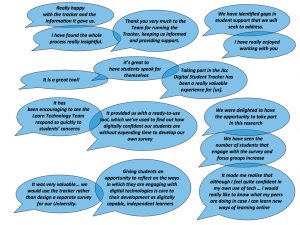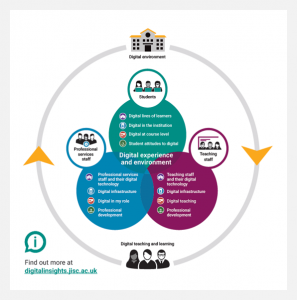This page provides information about the Jisc student digital experience service. If you’ve arrived here it may be because:
- Your organisation is running a survey for professional services and/or teaching staff. If this is the case, there will be local information about why the survey is being run and how the results will be used.
- Your organisation is running the digital student experience insights with students and you want to know more.
- You’re just interested to know more about the project.
The information on this page is especially for professional services and teaching staff. The links on the page and in the menus are to information for people who are involved in other roles. You’re welcome to explore – we are completely open about our purpose and process – but you may find that information does not address your concerns directly. If you have any questions or concerns that are not answered here or in your own organisation, please contact us. We will add to this page based on what staff tell us you want to know.
What is the ‘student digital experience‘ exactly?
Research carried out by Jisc between 2013-16 found that digital issues are increasingly important in the overall student experience. For example:
- Students’ first contact with their place of study is usually online, and many induction processes happen online pre-arrival.
- Students’ sense of their place of study and their role in it is often mediated through digital systems – virtual learning environments, library systems, assessment systems, learner data systems, course information systems etc.
- Students expect their learning providers to offer a range of digital services, from reliable wifi and printing to online course materials and learning support.
We see all these as aspects of the digital environment for learning. In addition:
- Courses of study typically include digital practices of the relevant subject area, as an integral part of the learning.
- Courses of study typically include elements of online, blended or ‘technology-enhanced’ learning as organisations adopt these approaches.
- Digital capabilities are important aspects of employability, and often included in course outcomes and graduate attributes.
We see all these as aspects of the digital curriculum.
Our approach engages students in dialogue about both the digital environment for learning and the digital curriculum.
Why a dedicated service?
Organisations collect a lot of information about students, but we found they did not collect evidence about these digital issues consistently, or coherently, or in many cases at all. Students were telling us that they did not have opportunities to discuss their digital experience or engage in projects to improve it. The Student digital experience service was developed in response to these findings. Over two years of intensive piloting (2016-18) we have involved over 150 organisations and tens of thousands of students.
Our formal evaluation found that the service has helped them to:
- gather evidence from learners about their digital experience;
- make better informed decisions about the digital environment;
- target resources for improvement e.g. investing in systems, student skills and staff development;
- plan other research, data gathering and user engagement around digital issues;
- demonstrate quality enhancement.
In addition, having access to so much evidence about students’ digital experience allows Jisc to write reports and make policy recommendations to sector bodies. All out reports and outputs can be found here. These show the kind of evidence that might be gathered and analysed at your own institution.
So what is the digital experience insights service?
- Our insights surveys provide powerful data on how an institution’s students and staff are using technology in learning and teaching
- Designed to help institutions to understand and improve the digital experience they offer
- Address the challenges institutions face – we have worked with 100+ organisations and 100,000+ students to pilot and refine our surveys
- An active community of practice with regular online and face-to-face events
- Extensive guidance on how to run the service locally and advice on engaging staff and students in dialogue
Organisations are free to use different elements of the service, which is why as a member of staff you may encounter it in different ways.
Why and how are professional services and teaching staff involved?
We all know that student surveys have a mixed press at the moment. One reason is that students see data being siphoned off to create a national benchmark, rather than being owned and analysed locally, with their involvement. Our service addresses that concern with our focus on engagement, and with a data co-ownership model that gives organisations the power to analyse and use their own data exactly as they choose. We strongly recommend that students and staff are involved at every stage.
As a member of staff you may be involved in the student survey by:
- communicating about it to students and encouraging them to complete the survey;
- helping to analyse the data, particularly about digital systems, learning and curriculum issues (e.g. as a member of a working group or similar);
- using the findings in your own work to support students more effectively.
Another problem with surveys is that staff can feel at the mercy of student opinion, with their own perspective being sidelined. Staff have their own experience of the digital environment within their roles, whether in teaching or as part of professional services. They are key to enabling students’ digital experience in the curriculum, as well being key in terms of the student interaction with professional services – whether that is through contact with professional services members of staff or the digital systems that they use, but students may not know what constraints and opportunities staff have to work with. For these reasons we have launched dedicated surveys for both professional services and teaching staff.
What’s in the teaching and professional services staff survey and why should I take part?
The teaching and professional services staff surveys mirrors the student survey quite closely. We ask questions in four areas as shown below:
Some of these are closed questions which can be compared and benchmarked with other organisations. Some are open questions, allowing you to report on your experience in your own words. Still others can be customised by your institutional lead, so you may find questions that relate to specific local issues. Taking part in the survey has no personal benefits – it is entirely anonymous. Collectively, however, it allows you to have your say, and play your part in highlighting issues that need attention.
Locally, your responses are held securely and anonymously. Your organisation can only see summative data and can’t trace individuals or small groups of staff. The survey system we use (Jisc online surveys) has been developed specifically for use in education and has the highest standards of data security and protection.
Through our data co-ownership model, we at Jisc can see summative data from all the participating institutions. We only publish that data in an aggregate form, so individual organisations are never publicly identified or compared. We use aggregated data so that we can learn and share lessons at a national and international level.
How can I find out more?
Explore the our website here and blog posts relating to the service here for more information.
Contact your local coordinator. Details should be on any publicity about the service, which may be called something different in your organisation but should carry a Jisc logo as you see at the top of this page.
If you have any more questions or would like to know more about the service, please email help@jisc.ac.uk (putting ‘digital insights’ in the title).



